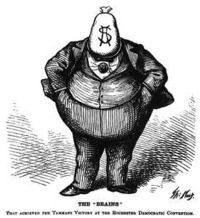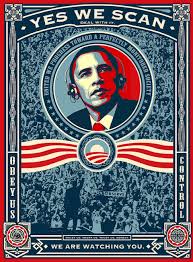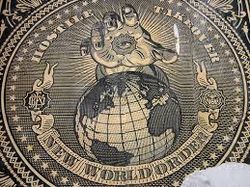Think of this as Volume 18, Number 28 of the newsletter I have written weekly since March, 1997. Enjoy.

Lines between cities and counties, between states, and between countries are easily crossed by the ultra-wealthy, and by multinational companies. Because they can so easily cross Lines, these people and entities have become the world’s de-facto government, under the principle that any person or group more powerful than the government becomes the government.
This is why the rich pay no taxes. This is why multinationals are able to extract tax concessions from states, cities and even countries. They can choose where to invest, where to live, and in what jurisdiction to account for income. This makes them self-governing in a way the rest of us aren’t.

We need to build that consensus.

The first halting steps toward challenging the Feudal World Order are being taken right now, by this Administration. A pivot away from wars over territory, a willingness to engage with any nation or system of government, a new emphasis on treaties, these are early days but important steps.
It’s a dramatic change, moving from opposing nations to opposing people and small groups, which is one reason it’s being downplayed. And the ultra-wealthy have many levers they can press to fight back, no matter what the politics of the target. The left protests the negotiation of trade treaties, fearing threats to civil liberties. The right protests peaceful international engagement, fearing a loss of national sovereignty.
There are also national interests other than our own at play. Russia’s government often acts as a mouthpiece for its own oligarchs, who benefit enormously from international tensions like those in the Ukraine and its “near abroad.” President Vladimir Putin has made scapegoats of some oligarchs, but continues to do the bidding of others. Other nations put their own national interests over the interests of international order, and often the U.S. has been among those countries.

Thus most Americans don’t know who their real enemies are, and have no idea where their best interests lie. On both sides, political contributors who are part of the Feudal Elite egg their partisans on, fully aware of what’s going on.
Sometimes this gets pretty blatant. Billionaire Tim Draper (left) has gotten a proposal on California’s ballot to split the state into six pieces, creating more Lines. Presumably one or more of those states could be controlled by his allies, but that’s not the point. The point is that the addition of Lines makes the work of division, which is in Draper’s personal financial interest, easier.
In Europe the former head of Luxembourg, a notorious tax haven, is now the president of the EU. How can we get agreements to close tax shelters when one of their leaders is running the whole union? UK President David Cameron made a great show of protest, but the UK controls most of the world’s most abusive tax shelters – the Isle of Man, Jersey and the Cayman Islands. Pot, meet kettle.
The old days when ships were registered in Liberia or Panama to escape taxes and regulation will look quaint by comparison, but they were the canary in the coal mine of what is taking place now.
As with previous generational crises, this is something that will take a generation to sort out. It took 36 years to turn the Nixon Thesis into Republican political dominance, with a judicial veto. It took 32 years for the New Deal to fulfill its promises of unity. Don’t think that a job is done once a political re-alignment happens. That is when the job begins.

At the start of 2009 we were engaged in two enormous wars. At the end of this year we’ll be engaged in none, although we’ll have troops stationed in both war zones. Turning such a retreat into advance requires stability, and in neither case is the job fully done.
Part of the problem here is that diplomacy has to be conducted in secret to a certain extent. Once agreements are reached, then democracy can work, but absent agreement between governments democracy just gets in the way of agreement. Could IBM and Apple have made their recent business agreement if all their shareholders had been in on it, with the power to niggle over the details? Same thing with governments, many of which are worth less than IBM or Apple.
It’s amazing how poorly peace polls, and how easy it is to manipulate populations toward war. It’s easier to fear enemies than to embrace friends.
That’s why this implicit political struggle needs to become explicit. Political leaders need to make international order a code word, not just for dealing with crime and drugs, but oligarchical power. Validating the Obama Thesis of Consensus includes imposing requirements on those who would be “inside” the order against those who would be “outside.” We know that international criminal gangs are outside. We know that international terrorists are outside it.
But what about international businesses? What about mobile oligarchs?

Everyone must be under the rule of law. The rule of our law should only protect those who are willing to abide by our law. Those who agree to live under a weaker power’s law do not deserve the full protection of our law.
We can also act, as a nation, against those companies and individuals who would use our internal Lines against the rule of our law. We can pass laws that prohibit the blackmailing of states and cities in the name of “economic development” and induce states to negotiate with one another, rather than competing with one another, in this area.
But in order to do this, we need a consensus, within both parties, that this makes sense. And to obtain such a consensus, we’re going to have to identify oligarchs and companies who act above the law as acting against it. The present moves against the Koch Brothers are defensive in nature, but at some point we need to go on offense. The Kochs are relatively benign, believe it or not, seeking mainly to twist national policies to their preferred ends rather than set nations against each other for their financial benefit.
So we need to create principles of good conduct, for people and for corporations, and insist they be followed on a global basis. Pay your taxes wherever your money is made. Don’t manipulate cities, states and countries in your own self-interest. Be a citizen.
Or be an outlaw.










